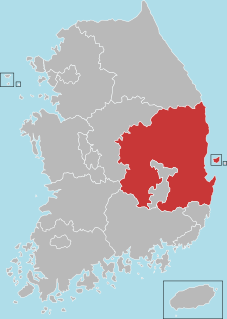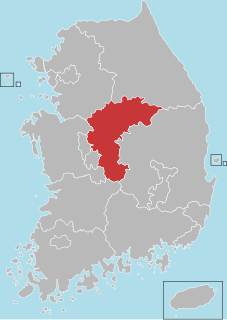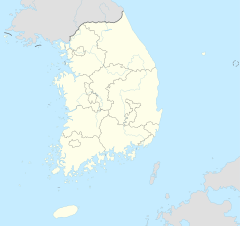
North Gyeongsang Province is a province in eastern South Korea. The province was formed in 1896 from the northern half of the former Gyeongsang province, and remained a province of Korea until the country's division in 1945, then became part of South Korea.

North Chungcheong Province, also known as Chungbuk, is a province of South Korea. North Chungcheong has a population of 1,578,934 (2014) and has a geographic area of 7,433 km2 located in the Hoseo region in the south-center of the Korean Peninsula. North Chungcheong borders the provinces of Gyeonggi and Gangwon to the north, North Gyeongsang to the east, North Jeolla to the south and South Chungcheong, Sejong Special Autonomous City and Daejeon Metropolitan City to the west.

Gyeongsang was one of the eight provinces of Korea during the Joseon dynasty. Gyeongsang was located in the southeast of Korea.

Seowon were the most common educational institutions of Korea during the mid- to late Joseon Dynasty. They were private institutions, and combined the functions of a Confucian shrine and a preparatory school. In educational terms, the seowon were primarily occupied with preparing students for the national civil service examinations. In most cases, seowon served only pupils of the aristocratic yangban class. On 6 July 2019, UNESCO recognized a collection of nine seowon as a World Heritage Site.

The Yeongdong Line is a line of Korail. It connects Yeongju in North Gyeongsang Province with Gangneung in Gangwon Province. From Yeongju, it crosses the Taebaek Mountains and reaches the Sea of Japan at Donghae, thence proceeding north to Gangneung.
Lee Chul-woo is a member of the Gyeongsangbuk-do Provincial Council, the chief legislative body of Gyeongsangbuk-do, South Korea. He is the current chairperson of the council. He represents Cheongdo County.
This is a list of Korea-related topics beginning with C. For Korean words starting with ㅈ, see also under J
This is a partial index of Korea-related articles beginning with G. For Korean words starting with ㄱ, see also under K.
This is a partial index of Korea-related articles beginning with U. For Korean words starting with 으, see also under E.
Bexel Co, Ltd. is a South Korean chemical company specializing in battery manufacture. It is headquartered in Yangpyeong-dong Yeongdeungpo-gu, Seoul and Gongdan-dong, Gumi, Gyeongsangbuk-do, Korea. Established in 1978, it also manufactures other electronic products. Manufacturing is based in Gumi, Gyeongsangbuk-do.

The Liancourt Rocks are a group of small islets in the Sea of Japan. While South Korea controls the islets, its sovereignty over them is contested by Japan.

Legislative elections were held in South Korea on 13 April 2000.
Hong Cha-Ok is a former female table tennis player from South Korea who competed in the 1988 Summer Olympics and the 1992 Summer Olympics. She was a member of the Korea Unified team for the 1991 World Table Tennis Championships in Chiba City, Japan.
Lee Cheol-uoo, also spelled Lee Cheol-woo, is a member of the National Assembly of South Korea. He was vice-governor of the Gyeongsangbuk-do Province from December 2005 to January 2008. He is currently the governor of North Gyeongsang Province.
Daegu-Gyeongbuk or Taegu-Kyŏngbuk is the compound word of Daegu and Gyeongbuk, and indicates both administrative regions in South Korea. The region usually forms the similar political, economic, and cultural area. Daegu is an independent city from Gyeongsangbuk-do and has the same administrative status with its mother province. Both have their separate local governments reporting directly to the national government.

Bogwangsa is a temple located in Gyeongsangbuk-do, South Korea.

Anguksa, Haanguksa or Lower Anguk Temple is a temple located in Pohang, Gyeongsangbuk-do, South Korea.

Yes Gumi FC is a South Korean professional futsal club based in Gumi, Gyeongsangbuk-do. The club was founded in October 2009.

Gyeongju World is a theme park in Gyeongju, Gyeongsangbuk-do, South Korea. Gyeongju World is composed of 'X-zone', 'Snow sled garden', and 'Wizard Garden'. The 'X-zone' is composed of the Paethon, the Megadrop, the Tornado, and the Exploration of Grand Canyon. There are ski sleds, adult sleds, and children's sleighs in Snow sled garden. Wizard Garden is a children's termament with a wide variety of children's rides.










